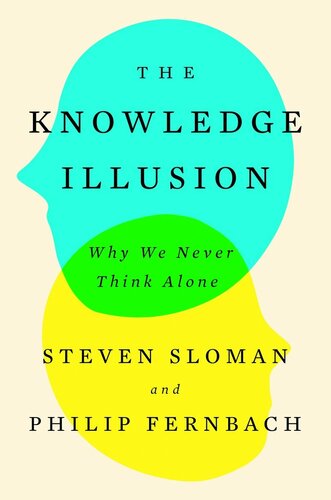
The Knowledge Illusion
Why We Never Think Alone
کتاب های مرتبط
- اطلاعات
- نقد و بررسی
- دیدگاه کاربران
نقد و بررسی

November 14, 2016
Sloman, a professor of cognitive, linguistic, and psychological sciences, and Fernbach, a cognitive scientist and professor of marketing, attempt nothing less than a takedown of widely held beliefs about intelligence and knowledge, namely the role of an individual’s brain as the main center for knowledge. Using a mixture of stories and science from an array of disciplines, the authors present a compelling and entertaining examination of the gap between knowledge one thinks one has and the amount of knowledge actually held in the brain, seeking to “explain how human thinking can be so shallow and so powerful at the same time.” The book starts with revelatory scholarly insights into the relationship between knowledge and the brain, finding that humans “are largely unaware of how little we understand.” Sloman and Fernbach then take the reader through numerous real-life applications of their findings, such as the implications for non-experts’ understanding of science, politics, and personal finances. In an increasingly polarized culture where certainty reigns supreme, a book advocating intellectual humility and recognition of the limits of understanding feels both revolutionary and necessary. The fact that it’s a fun and engaging page-turner is a bonus benefit for the reader. Agent: Christy Fletcher, Fletcher and Co.

January 15, 2017
A tour of the many honeycombs of the hive mind, courtesy of cognitive scientists Sloman (Brown Univ.) and Fernbach (Univ. of Colorado).You know more than I do, and you know next to nothing yourself. That's not just a Socratic proposition, but also a finding of recent generations of neuroscientific researchers, who, as Cognition editor Sloman notes, are given to addressing a large question: "How is thinking possible?" One answer is that much of our thinking relies on the thinking of others--and, increasingly, on machine others. As the authors note, flying a plane is a collaboration among pilots, designers, engineers, flight controllers, and automated systems, the collective mastery or even understanding of all of which is beyond the capacity of all but a very few humans. One thought experiment the authors propose is to produce from your mind everything you can say about how zippers work, a sobering exercise that quickly reveals the superficiality of much of what we carry inside our heads. We think we know, and then we don't. Therein lies a small key to wisdom, and this leads to a larger purpose, which is that traditional assessments of intelligence and performance are off-point: what matters is what the individual mind contributes to the collectivity. If that sounds vaguely collectivist, so be it. All the same, the authors maintain, "intelligence is no longer a person's ability to reason and solve problems; it's how much the person contributes to a group's reasoning and problem-solving process." This contribution, they add, may not just lie in creativity, but also in doing the grunt work necessary to move a project along. After all, even with better, more effectively distributed thinking, "ignorance is inevitable." Some of the book seems self-evident, some seems to be mere padding, and little of it moves with the sparkling aha intelligence of Daniel Dennett. Still, it's sturdy enough, with interesting insights, especially for team building.
COPYRIGHT(2017) Kirkus Reviews, ALL RIGHTS RESERVED.

March 1, 2017
We wander around in a fog of unknowing, argue Sloman (cognitive, linguistic, & psychological sciences, Brown Univ.; editor in chief, Cognition) and Fernbach (marketing, Leeds Sch. of Business, Univ. of Colorado). We depend on a web of experts and the technology they've created to keep our world going. Even Paleolithic societies had specialists--shamans, flint knappers, etc. The downside is that we tend to think that we know more than we do. Most people, for example, say that they understand how a toilet works or why a certain social policy should be enacted. But when asked to describe plumbing or explain why they advocate a policy, they are unable to do so. This is called the "Illusion of Explanatory Depth." It can lead to flooded bathrooms and wars. Sloman and Fernbach offer suggestions for minimizing the damage that this can cause, but, interestingly enough, this book illustrates the problem of specialization. The authors apparently aren't aware of some of the classic work done on values change by social psychologists. VERDICT General readers who like the work of Malcolm Gladwell will enjoy this book.--Mary Ann Hughes, Shelton, WA
Copyright 2017 Library Journal, LLC Used with permission.

























دیدگاه کاربران